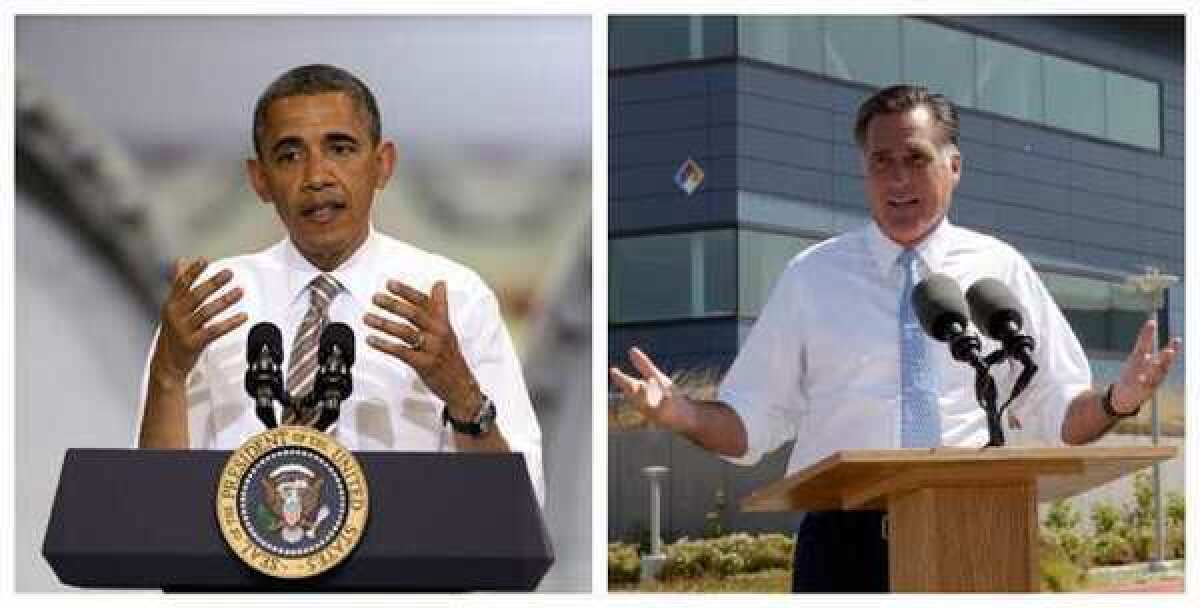McManus: Attack-dog days of summer

- Share via
The dog days of July were once a slow time in our presidential campaigns, a time when candidates could take vacations and voters could take a break. The party conventions were still a month or more away; aside from fundraising and backroom strategizing, there wasn’t much to see.
But that quaint old calendar is gone now; no lazing by Lake Winnipesaukee allowed. This month, the presidential campaign has rampaged along at full force, fueled by millions of dollars in donations and polls that seem locked in a virtual tie.
That’s how we find ourselves in midsummer arguing not over the best way to revive the economy or to fix the healthcare system but over exactly when Mitt Romney left his job at Bain Capital — was it 1999 or 2002? — and whether President Obama is dishonoring his office by playing so rough.
COMMENTARY AND ANALYSIS: Presidential Election 2012
Those aren’t the issues that will decide this election. This month’s controversies are a preliminary bout, a push by each candidate to drive up the other’s “negatives.” But such battles have turned July into an unexpectedly important test for both sides.
What the Obama campaign is doing to Romney this month comes straight out of the textbook: If voters don’t know much about your opponent — and polls show most voters know little about Romney — jump into the vacuum and define him yourself.
If your opponent is running on his record as a businessman, talk about the employees he laid off. If your opponent won’t release old income tax returns, charge that he must be hiding something.
Best and worst political ads from the presidential election season
“Romney is more vulnerable than Obama because he is less known,” the president’s chief strategist, David Axelrod, told me in an email. “It’s all new information” — to most voters, anyway.
That’s why the Obama campaign has been spending millions of dollars on television advertising in swing states like Ohio and Florida at this unusually early stage of the campaign — to try to turn voters against Romney before the Republican has a chance to introduce himself properly. There’s evidence that the gambit is working; in the swing states, voters are more likely to say Romney’s business background is a negative, not a positive.
Initially, the Romney campaign dismissed Obama’s attacks as ineffective. “They’re not sticking,” a Romney advisor told me in June. Besides, the last thing the GOP candidate wanted was to be drawn into an argument about his personal finances; he preferred to keep the conversation on Obama’s disappointing economic record.
“If you’re responding, you’re losing,” Romney told a Fox News interviewer. But by the end of last week, the GOP candidate decided that he needed to answer the charges and changed course, issuing a flurry of angry rejoinders and a television commercial charging that Obama wasn’t telling the truth.
Who won the exchange? Obama, for now. His campaign succeeded in getting the media to pay attention to the question of whether Romney still controlled Bain Capital in 2000, when at least one of its companies moved some U.S. jobs to Mexico. And as long as Romney resists releasing his income tax returns for the years before 2010, he’ll remain vulnerable to the charge that he’s hiding something, even if it’s only a string of years in which he made dizzyingly high amounts of money and paid impressively low tax rates.
But the Romney campaign also survived an important test — a test of self-restraint. During the primary campaign, Romney occasionally got rattled and uttered a memorable gaffe when he was questioned about his personal wealth. One of the Obama campaign’s not-very-secret goals was to see if they could bait him into doing it again.
“He’s gone two months without saying anything stupid,” noted Eddie Mahe Jr., a former deputy chairman of the Republican National Committee. “He hasn’t screwed up, and that’s important.”
Some Republicans may want more fire from Romney, but one advisor told me less is more. “Romney’s campaign is risk-averse because a challenger to a weak incumbent needs to be acceptable” to as many voters as possible, he said. “That, with a weak economy, is his best chance of winning.”
Still, Romney needs to change the subject. He could do that by naming his choice for vice president early. (Betting has swung toward Tim Pawlenty, the former governor of Minnesota, a conservative with an appealing blue-collar life story.) He could unveil a slimmed-down version of his unwieldy 59-point economic plan, as some advisors have proposed. Or maybe just take a trip to Israel, Poland and the London Olympics, as he plans to do at the end of the month.
Obama needs to turn a corner as well — to convince voters that he has a plan for his second term that will work better than his first. He has plenty of proposals, of course, laid out in budgets and State of the Union speeches. But at the moment, his campaign is mostly about castigating Romney and Republicans in Congress. “He needs to move from the past to the future,” advises Tad Devine, a Democratic strategist who helped run John Kerry’s presidential campaign in 2004.
In other words, enough with the negatives. Can we stipulate that neither one of these guys is Abraham Lincoln, and move on?
Patience, their strategists say. The main events and the serious content are still to come: the conventions, the debates, the frenzied home stretch in the fall.
In the meantime, driving up the other guy’s negatives with a flurry of punches is what it’s all about.
Election day is less than four months away, but it’s going to feel like a long time.
More to Read
Get the L.A. Times Politics newsletter
Deeply reported insights into legislation, politics and policy from Sacramento, Washington and beyond. In your inbox twice per week.
You may occasionally receive promotional content from the Los Angeles Times.











